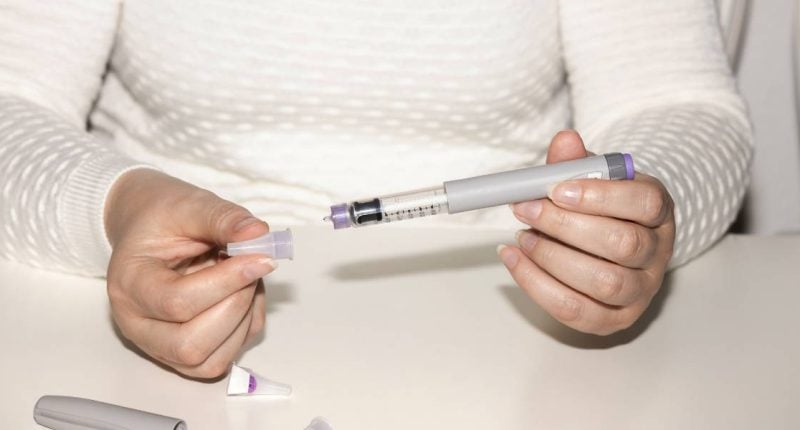Hundreds of people using Ozempic, Wegovy and Mounjaro have suffered from ‘life-threatening’ bowel injuries, experts have said.
After using a weight loss jab, one woman was told she will now have diarrhoea for the rest of her life and ‘will never have a solid bowel movement again’.
Another woman using the weight loss drugs lost her teeth after she vomited so much they fell out.
- 1500% surge in semaglutide overdose reports
- Weight loss drug semaglutide reduces the risk of cardiovascular events
- Man arrested on suspicion of selling unauthorised semaglutide
Lawsuits are now being made against Novo Nordisk due to the company not warning people about the severe health complications associated with its drugs Ozempic and Wegovy.
In addition, Eli Lilly, the maker of Mounjaro, is also being faced with several lawsuits after people have experienced bad side effects after using its diabetes drug.
Many individuals using the weight loss injection have gone on to suffer from gastroparesis – paralysis of the stomach.
The potentially life-threatening condition makes your stomach muscle contractions weaker and slower, leading to food sitting too long in your gut.
People with gastroparesis are likely to experience severe side effects, such as nausea, vomiting and severe pain in the stomach.
A woman who used Wegovy went a week without any bowel movement and was diagnosed with severe gastroparesis in hospital.
The American law firm Levin Papantonio Rafferty is legally supporting 100 people who developed gastroparesis after using the drugs.
Attorney Cameron Stephenson said: “There’s no doubt in my mind that there are going to be 1000s of cases that will be filed in the MDL over time.
- Semaglutide: weight loss jab associated with gastrointestinal problems
- Semaglutide could remove need for insulin injections in type 1 diabetes, promising study shows
- Wegovy: injection reduces risk of heart attacks and strokes by a fifth
“The legal action is focused on patients who were medically diagnosed with obstruction or gastroparesis and required emergency treatment or hospital intervention.”
He continued: “The point is that if these drugs carry with them a potentially permanent side effect or a side effect that can have extreme effects on someone’s health and their life you have to put that in the warning label.”
Typically, Ozempic and Mounjaro are used to treat type 2 diabetes, but more recently they have been prescribed off label for weight loss.
Cameron Stephenson said: “I expect to see documents to suggest that there was going to be off-label marketing and promotion outside of diabetes.
“I expect that the clinical trials and the things that they did in the various phases to come up with these drugs before they filed with the FDA, I think that they’re going to show that there was a risk of gastroparesis, and it’s not in the label, and it still isn’t in the label.”
Eli Lilly and Novo Nordisk are ‘vigorously defending against these claims’ and have said patient safety is their top priority.
In November, Kelly Robin, 49, started taking legal action against Novo Nordisk after she was diagnosed with gastroparesis whilst using Ozempic.
She said: “You can pretty much set your watch that if I took my injection on Sunday, that on Tuesday, I was going to be sick with vomiting and diarrhoea.”
The 49-year-old started using Ozempic to treat her type 2 diabetes. However, her endocrinologist advised her to take the drug through an off-label prescription.
Kelly said: “Every doctor’s visit that I went to, she kept telling me, ‘I really wish you would take this Ozempic’. The worst thing that it did for me was cause me almost to lose my job, because I was so sick with it that I could not go to work. I was so physically ill that I could not go to work.
“There were days that I would go to work, I would try and go to work, stay at work. And I couldn’t and the reason why [was] because I would be at work and I would soil my clothes.”
She added: “I would just soil my clothes, and I would be sick. And I would have to come home. It got to the point where I had to pack a bag with a change of clothes so if I got sick at work, I could change clothes.
“I still have flare ups of gastroparesis even after coming off Ozempic. I just think it’s going to be something I’m going to have to live with for the rest of my life.”
- Wegovy: NHS receives limited stock of weight-loss injection
- European Medicines Agency recommends weight loss drug Wegovy for teenagers 12 and up
- Wegovy: NHS weight loss drug is no magic pill, experts warn
The FDA said: “If newly identified safety signals are identified, the FDA will determine what actions are appropriate after a thorough review of the body of evidence.”
Novo Nordisk said: “Novo Nordisk believes that the allegations in the lawsuit are without merit, and we intend to vigorously defend against these claims.
“Patient safety is our top priority at Novo Nordisk, and we work closely with the U.S. Food and Drug Administration to continuously monitor the safety profile of our medicines.”
They added: “GLP-1 medicines have been used to treat type 2 diabetes for more than 18 years, and for the treatment of obesity for 8 years.
“This includes Novo Nordisk GLP-1 products such as semaglutide and liraglutide that have been on the market for more than 13 years.
“Semaglutide has been extensively examined in robust clinical development programs, large real world evidence studies and has cumulatively over 9.5 million patient years of exposure.
“The known risks and benefits of semaglutide and liraglutide medicines are described in their FDA-approved product labelling.
- Research shows Mounjaro achieves better weight loss results than Wegovy and Ozempic
- Mounjaro: new weight loss jab approved in the UK
“Novo Nordisk stands behind the safety and efficacy of all of our GLP-1 medicines when they are used as indicated and when they are taken under the care of a licensed healthcare professional.”
Eli Lilly said: “Patient safety is Lilly’s top priority, and we actively engage in monitoring, evaluating, and reporting safety information for all our medicines.
“Our FDA-approved label clearly warns that tirzepatide may be associated with gastrointestinal adverse reactions, sometimes severe.”
They added: “The label further states that tirzepatide has not been studied in patients with severe gastrointestinal disease, including severe gastroparesis, and is therefore not recommended in these patients.
“These risks were communicated to, and widely known by healthcare providers. We will vigorously defend against these claims.”





